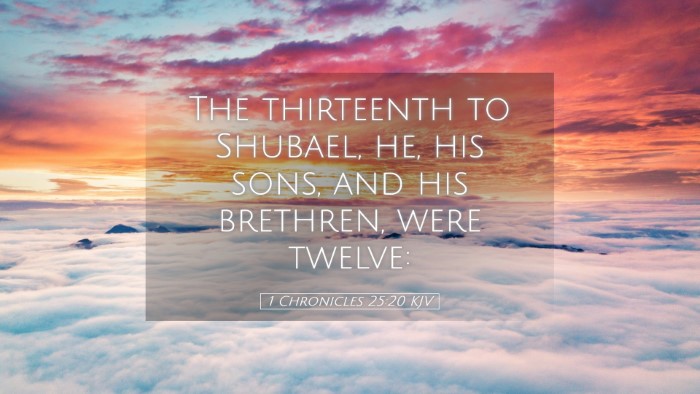Commentary on 1 Chronicles 25:20
Bible Verse: 1 Chronicles 25:20 - "And of the sons of Merari; their brothers were at the other side: Ethan the son of Kishai, the son of Abdi, the son of Malluch."
Introduction
This verse is part of a larger narrative detailing the organization of the Levites in the service of the Temple. In particular, 1 Chronicles 25 addresses the musicians who were appointed to lead worship during the time of David. The mention of Ethan and his lineage serves to highlight the importance of proper genealogical records in forming the worship structure of ancient Israel.
Background on the Sons of Merari
The Merarites were one of the three families of the Levites, whose role specifically included the care of the tabernacle and its surroundings. This particular verse emphasizes their connection to the Levitical priesthood and the worship practice instituted by David.
Importance of Genealogy in Worship
Matthew Henry's Commentary: Matthew Henry notes that the genealogical listings in Scripture serve a dual purpose: they affirm the legitimacy of the priesthood and underscore God's faithfulness to His promises through successive generations. In this context, tracing the lineage of Ethan connects the spiritual duties of the Levites to God's covenant with Israel.
Albert Barnes' Notes: Barnes points out that understanding these lineages helps in comprehending the organization of services in ancient Israel and reflects on how each family had specific roles. Each Levite family had a unique contribution to the Temple services, which was essential for correct worship practices.
Ethan, the Son of Kishai
Ethan is a notable figure as he is identified as a leader among the Merarites. His father, Kishai, and grandfather, Abdi, indicate a respected line within the tribe of Levi.
The Role of Musicians in Worship
The specific mention of musicians in this context illustrates the emphasis on music and worship in the corporate gathering of Israel. Worship through music was not merely a background activity but an essential aspect of communal and individual piety.
- Adam Clarke's Commentary: Clarke elaborates on the significance of music and notes that it was an integral part of expressing devotion to God. The Levites, particularly those listed in this chapter, were responsible for leading the entire congregation in praises, enhancing the worship experience.
The Significance of Ethan's Lineage
The lineage presented in this verse help contextualize Ethan's significance and place within God’s grand narrative. His lineage shows that he was part of a divinely ordained structure meant to lead God’s people.
- Spiritual Leadership: The Levites, as representatives of the Israelites before God, faced the high calling of being spiritual leaders. Their genealogy signifies their chosen status, which was critical for their role in the Temple.
- Evidencing God's Plan: The mention of specific names in Ethan's lineage serves as a reminder of the covenantal promises fulfilled through generations, portraying the faithfulness of God in maintaining the line of service.
Contemporary Relevance
For today’s pastors, theologians, and students, the emphasis on organized worship remains pertinent. Understanding the historical context and careful organization of roles can guide current practices in church leadership and worship settings.
- Reflection on Service: Much like the Levites, church leaders today are called to serve in specific capacities. The acknowledgment of their backgrounds can inspire a sense of identity and responsibility.
- Integration of Music in Worship: As seen in this passage, the integration of music in worship settings is vital. Modern worship requires similar dedication and organization, as emphasized during the time of David.
Conclusion
The genealogical note in 1 Chronicles 25:20 not only provides historical context but also serves as a reminder of the importance of identity, service, and devotion in worship. The lineage of Ethan and his identification as a musician reminds us of the continued relevance of orderly worship and the crucial roles that individuals play within the larger body of the church.


